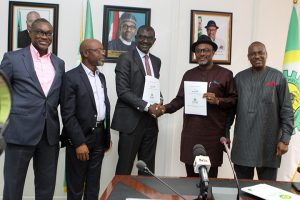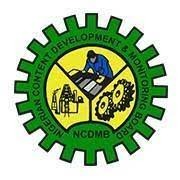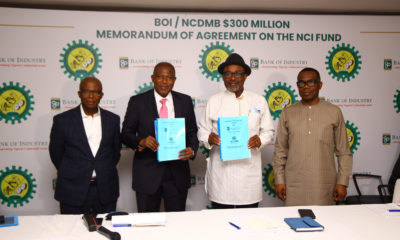Energy
NCDMB, NEXIM Bank sign deal on US$30m Working Capital Fund for Oil Firms

Precious ADELOLA
ABUJA-THE Nigerian Content Development and Monitoring Board (NCDMB) and Nexim Nigerian Export-Import Bank on Wednesday in Abuja signed a memorandum of understanding on the administration of US$30 million Working Capital Fund for oil and gas service companies.
The Fund was conceived by the NCDMB to support the operations of local oil companies against the adverse effects of COVID-19 Pandemic, loss of contracts due to low oil price and ensure the companies retain their personnel in employment.

Chairman of Petroleum Technology Association of Nigeria, Mr. Nicolas Odinuwe; Managing Director, Nexim Nigerian Export-Import Bank, Mr. Abubakar Bello; Executive Secretary, Nigerian Content Development and Monitoring Board, Engr. Simbi Kesiye Wabote and President Oil and Gas Trainers Association of Nigeria, Mazi Sam Azoka Onyechi at the signing of a memorandum of understanding on the administration of US$30 million Working Capital Fund for oil and gas service companies
The Working Capital Scheme is one of the newly introduced products in the Nigerian Content Intervention Fund (NCI Fund) approved by the NCDMB Governing Council under the leadership of the Minister of State for Petroleum Resources, Chief Timipre Sylva.
Target beneficiaries include members of the Petroleum Technology Association of Nigeria (PETAN) and Oil and Gas Trainers Association of Nigeria (OGTAN) that are commercially viable with a business relationship with either an International Oil Company or major Nigerian Oil Company.
Giving details of the Fund, the Executive Secretary of NCDMB, Engr. Simbi Kesiye Wabote stated that the roll-out date is July 1, 2021, and Nexim Nigerian Export-Import Bank would provide matching funds of the same amount in Naira.
He said “the scheme would cover loans for working capital support and capacity building, invoice discounting and capacity building, including acquisition of low-end equipment to service short-term contracts/service obligations.”
The Executive Secretary also explained that the maximum amount that can be borrowed by a single obligor is US$1,000,000 or its Naira equivalent, while the tenor of the loan would be up to 12 months for Working Capital loans and up to 3 years for Capacity Building loans with moratorium of up to 12 months.
“The applicable interest rate shall be 5 percent per annum all-in for Dollar-denominated loans and 8 percent all-in per annum for Naira-denominated loans and the rate shall be fixed throughout the tenor of the loan. Maximum processing time shall be 21 working days from the date the applicant has provided all required documentation,” he added.
He also confirmed that ”all applications for the fund shall be through the web and NEXIM shall develop and avail a dedicated portal to facilitate the process, with access given to designated NCDMB staff for monitoring and necessary functions.”
Transactions that are eligible for funding support include those connected with oil service contracts, projects or contracts that boost the operations and viability of a qualifying service providers and transactions for the supply of low-end assets or other equipment for the execution of an oil service contracts from IOCs/ major NOCs.
Wabote clarified that the Board’s Fund arrangement with the Bank of Industry would continue. He said: Our intervention with the Bank of Industry is very successful. We audit the process periodically and we have 98 percent compliance in terms of pay back of the loan by creditors.”
In his comments, the Managing Director of Nexim Nigerian Export-Import Bank, Mr. Abubakar Bello explained that the financial institution was collaborating with NCDMB with a goal to support local service companies to export their services outside the country.
He said: “As the oil and gas industry in other African countries open, the capacities that have been built over time in the Nigerian oil and gas sector can be exported to other African countries and even outside Africa.
“We are going to support the development of capacities of indigenous servicing providers to be able to take them to other oil economies. Since services provide over 15 percent of Nigeria’s Gross Domestic Product (GDP), we should be able to delve into other climes.”
Energy
Nigeria’s Gas Output Increases By 2.9%, Reaching 2.29 MSCF

Amid a slight increase in gas production, Nigeria’s oil output experienced a substantial rise in November 2024.
Gas production saw a 2.9% month-on-month (MoM) increase, reaching 2,292,951 million standard cubic feet (MSCF) from 2,292,471 MSCF in October.
However, on a year-on-year (YoY) basis, the growth was minimal, with a mere 0.02% increase in output for the first 11 months of 2024, compared to the same period in 2023.
READ MORE: Tinubu Mourns Ex-U.S. President Jimmy Carter, Celebrates His Legacy
The latest gas report from the Nigerian Upstream Petroleum Regulatory Commission (NUPRC) also revealed a 1.6% increase in domestic gas consumption.
A total of 606,658 MSCF was consumed locally, compared to 596,861 MSCF during the same period in 2023. Gas exports, meanwhile, rose by 6.9%, reaching 829,156 MSCF, up from 775,547 MSCF in the corresponding period of 2023.
This growth in exports continues to play a vital role in bolstering Nigeria’s foreign exchange earnings.
Despite these positive figures, sources close to the Ministry of Petroleum Resources (Gas) noted that oil remains the dominant force in Nigeria’s energy sector, with gas taking a secondary role.
On the other hand, the NUPRC’s oil production report revealed a remarkable surge.
Nigeria’s oil output, including condensates, rose by 13.3% year-on-year in November 2024, reaching 1.7 million barrels per day (bpd), up from 1.5 million bpd in November 2023. Month-on-month, oil production also increased by 10%, from 1.5 million bpd in October 2024.
Dr. Muda Yusuf, CEO of the Centre for the Promotion of Private Enterprises (CPPE), discussed the broader structural dynamics within Nigeria’s economy, highlighting the dominance of the non-oil sector.
In his 2025 Outlook, Dr. Yusuf noted that the non-oil sector contributed 94.43% to Nigeria’s GDP in Q3 2024, while the oil sector accounted for just 5.57%.
“However, the economy is characterized by a paradox of the oil sector contributing an estimated 90% of foreign exchange earnings, while the non-oil sector accounts for about 10%,” Dr. Yusuf said.
“This is a structural shortcoming in our economy which needs to be addressed, as sectors that contribute hugely to GDP have no corresponding contribution to foreign exchange earnings.”
He further emphasized the need to address the challenges faced by the non-oil sector, which include issues related to productivity, infrastructure, funding, and regulatory constraints.
“The policy implication is that more should be done to fix the challenges of productivity and competitiveness of the non-oil sector of the economy,” Dr. Yusuf added
Energy
JUST IN: NNPC Ltd Reopens Warri Refinery

The Nigerian National Petroleum Company Limited (NNPC Ltd) has announced that the 125,000-barrel-per-day Warri Refining & Petrochemicals Company (WRPC) in Warri, Delta State, has become operational.
This is coming about a month after the commencement of operations at the 60,000-barrel-per-day-old Port Harcourt Refinery.
The Group Chief Executive Officer, NNPC Ltd, Mele Kyari, made the disclosure during a tour of the facility on Monday.
ALSO READ: SERAP Urges Tinubu To Direct CCB To Publish President’s, VP’s, Others Assets
A video posted by Channels TV on Monday showed Kyari addressing a tour team, which included the Chief Executive Officer of the Nigerian Midstream and Downstream Petroleum Regulatory Authority (NMDPRA), Farouk Ahmed.
Before the tour commenced, Kyari explained that the inspection aimed to show Nigerians the level of work completed so far.
According to him, although the repairs on the facility are not yet 100 per cent complete, operations have commenced.
He said, “We are taking you through our plant. This plant is running. Although it is not 100 per cent complete, we are still in the process. Many people think these things are not real. They think real things are not possible in this country. We want you to see that this is real.”
Located in Ekpan, Uwvie, and Ubeji, Warri, the petrochemical plant produces 13,000 metric tonnes per annum (MTA) of polypropylene and 18,000 MTA of carbon black.
Commissioned in 1978 and managed by NNPC Ltd, the WRPC was built to supply markets in the southern and southwestern regions of Nigeria.
The mechanical completion of the facility was initially scheduled for the first quarter of 2024, according to the Spokesperson of the NNPC Ltd, Olufemi Soneye.
“Warri should be done by Q1 (first quarter) 2024,” Soneye stated.
The WRPC is one of Nigeria’s four refineries. Others include the old and new Port Harcourt Refining Company in Rivers State and the Kaduna Refining and Petrochemical Company in Kaduna State.
Energy
Dangote Partnership: MRS Urges Nigerians To Insist On N935/Litre Petrol Price Nationwide

MRS Oil Nigeria Plc, a prominent player in the Nigerian downstream oil industry, has implemented a new petrol price of N935 per litre across all its retail service stations nationwide.
The company has also called on Nigerians to monitor and report any outlets that fail to adhere to the new price structure.
Biztellers reports that this is consequent upon an announcement by the President of Dangote Industries Limited, Aliko Dangote, that the Dangote Petroleum Refinery has partnered with MRS Oil and Gas to offer petrol at N935 per litre at retail outlets, following a reduction in the ex-depot price from N970 to N899.50 per litre.
ALSO READ: Dangote Slashes PMS Price To N899.50k
It was gathered that MRS Oil Nigeria Plc has instructed all its outlets to implement the new price immediately, setting up a digital platform and monitoring team to ensure full compliance.
In a statement on Monday night, the company declared, “Petrol is now being sold at N935 at MRS Filling Stations nationwide. If you find any station not following this price, please report it. Call 08009447853 or email: NG-FMKPMGWHISTLEBLOWING@NG.KPMG.COM”
Emphasising the eco-friendly nature of its products, MRS Oil added, “We call on all petrol station owners to join MRS Oil Nigeria Plc in improving the supply chain of our beloved country, ensuring product quality and availability in every corner of Nigeria for the benefit of all Nigerians.”
In Lagos, commuters were seen queuing at MRS filling stations to purchase petrol, with many expressing their gratitude to the Dangote Petroleum Refinery and MRS Oil and Gas, urging other marketers to support the indigenous refinery rather than import off-spec products into the country.
A commuter at the MRS station at Alapere on the Lagos Ibadan Express way, Ibukun Phillips, could not hide her joy as her husband filled up their car.
“I am very happy today. This is a victory for Nigeria,” she said. “The price reduction is the best gift of the season. But beyond just the reduction, we are buying standard, eco-friendly petrol at a lower rate. My husband and I have decided we will only be using MRS from now on because we are confident in the quality of the product and supporting the economy.”
A commercial bus driver, Adio Ajibade described the price reduction as a great relief, especially during the festive season.
“The reduction is a great relief. It will reduce transportation costs and benefit Nigerians. God will continue to bless Alhaji Aliko Dangote,” he said.
A public affairs analyst and university lecturer, Dr. Tunde Akanni, said the collaboration between Dangote Petroleum Refinery and MRS Oil represents a significant step towards improving the affordability, quality, and sustainability of petroleum products in Nigeria.
According to Dr. Akanni, “this move will not only help ease the financial burden on Nigerians but also promote a more environmentally conscious approach to fuel consumption, benefitting both the economy and public health in the long term.”
























